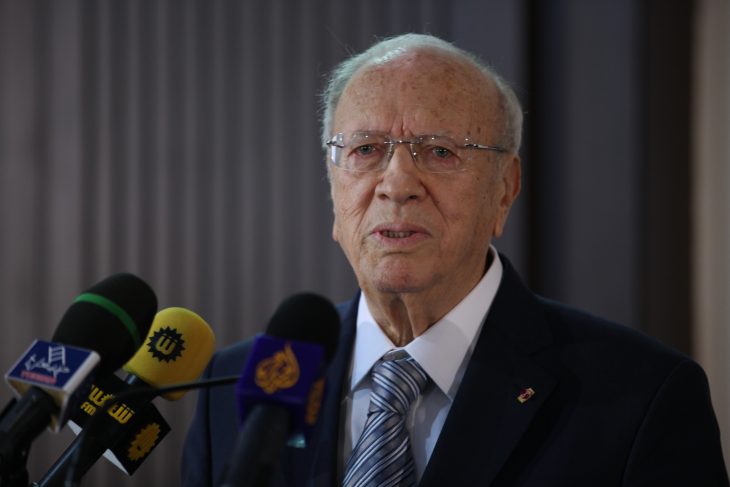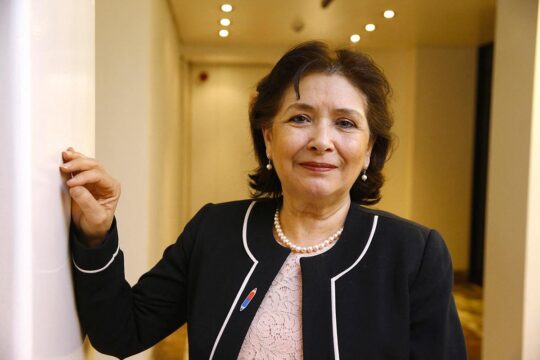In autumn 2014, campaigning was in full swing in Tunisia for legislative and presidential elections. Two political parties were running neck and neck at the top of the opinion polls, the moderate Islamist Ennahdha and Nidaa Tounès, a party created in July 2012 with figures from the Left, trade unionists, supporters of ex-President Bourguiba and officials from the regime of former President Ben Ali, who has been in exile in Saudi Arabia since the January 2011 revolution.
Nidaa Tounès won the legislative elections. Riding on this success, the party’s founder Béji Caied Essebssi, 88, was elected President. He is a veteran politician who held several ministerial posts under Bourguiba, led parliament briefly under Ben Ali and was Prime Minister in the second post-revolution government. During the campaign, one of his slogans and electoral promises was his insistence on “turning the page on the past once and for all” and on the idea of “national reconciliation”. A Transitional Justice Law was nevertheless passed in Tunisia in December 2013 and the Truth and Dignity Commission set up in June 2014.
“Turning the page on prosecutions”
In a March 20, 2015 speech on national Independence Day, the new head of state said that in view of collapsing economic indicators in these last four post-revolution years, he planned to introduce a bill on “economic reconciliation” to “calm the business climate and restore investor confidence”. More specifically, he stated in a March 27 interview with French magazine Paris Match that “transitional justice cannot convict everyone, but it has helped bring some comfort to the victims of the former regime. We need to stop settling scores with the past. We need to turn the page on prosecutions and work to ensure that Tunisians with money (Ben Ali supporters) start investing in Tunisia again and are useful to their country. There needs to be a transaction between them and the State so they repatriate their assets to invest here.”
On July 14, Béji Caïd Essebsi presented to his cabinet his proposed law on “special measures concerning reconciliation in the economic and financial sphere”. His speech on that occasion was broadcast on national TV. “What does it benefit us to lock people up?” he said. “The country needs everyone!”
Amnesty for dishonest civil servants
The 12-article bill is expected to be debated in parliament when it returns from recess at the beginning of September. Article 2 of the bill provides for an end to prosecutions, trials and implementation of sentences against public servants for misappropriation and embezzlement of public funds, except for acts of corruption and extortion involving public money. Article 3 provides that the State can conclude a reconciliatory deal with businessmen who have benefitted in the past from misappropriation of public funds, under which trials or implementation of sentences would be stopped. In exchange, they would have to reimburse the amount of funds misappropriated with 5% interest for each year since their incriminating act was committed. The bill also proposes an amnesty for illegal currency trading in return for paying 5% of the total value of non-declared gains. A six-person commission including representatives from the presidential office, Justice Ministry, Finance Ministry, the head of litigations for the State and two members of the Truth Commission, is to be set up at the President’s office to handle reconciliation requests and to monitor procedures. The evidence it gathers is to be confidential and its mandate not more than one year. Finally, Article 12 would scrap all provisions relating to corruption and misappropriation of public funds contained in the December 2013 organic law that governs the work of the Truth Commission.
Strong protest from the Truth Commission
The bill was drafted by the legal department of the President’s office, made up of three administrative judges working under head of the President’s office Ridha Belhaj -- the real architect of the bill --, without consulting any of the bodies directly concerned with handling corruption such as the Truth Commission, the commission in charge of confiscating illegally acquired assets and the national anti-corruption body. As soon as it was published, the bill brought strong anger from Sihem Bensedrine, President of the Truth and Dignity Commission, and the resignation of outspoken Judge Ahmed Souab from the confiscation commission.
“These reconciliation measures in the economic and financial sphere are the bill to be paid to businessmen close to the former regime who helped fund Nidaa Tounès, especially its election campaigns,” says professor of public law and civil society activist Jawhar Ben Mbarek.
Essebsi’s bill is above all a way to get even with the architects of the Transitional Justice Law, dominated at the time by Islamists whose number one political opponent and enemy was the founder of Nidaa Tounès. Two provisions concern him directly: the extension of the Truth Commission’s mandate to purging the “youssefites” (first opponents of Bourguiba) after Tunisia’s independence in 1956, a period during which Essebsi held posts of responsibility in the Interior Ministry, and “violations related to electoral fraud”.
“Electoral fraud and forced migration for political reasons are not punishable under existing Tunisian law,” warned Human Rights Watch in May 2014. “The initial bill did not mention them, but the Constituent National Assembly added them in such a way as to target political personalities of the former government, according to some observers. Including them would seem to violate the principle under which no-one can be convicted for something that was not considered a crime by either national or international law at the time it was committed.”
From the start, transitional justice in Tunisia has been the hostage of political manoeuvring and power play, which are constantly shifting…






